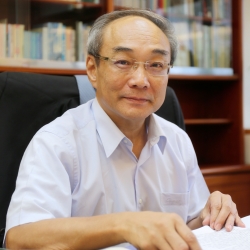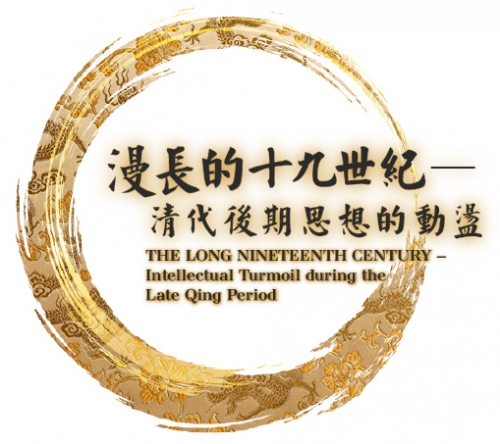Research
【Sin Wai-Kin Distinguished Visiting Professorship in the Humanities】 Lecture Series


講者 Speaker:
王汎森教授
冼為堅傑出訪問教授 (人文學科)
中央研究院歷史語言研究所特聘研究員及中央研究院院士
Professor Wang Fan-sen
Sin Wai-kin Distinguished Visiting Professor in the Humanities
Distinguished Research Fellow, Institute of History and Philology, Academia Sinica
Academician, Academia Sinica
王汎森教授是台灣大學歷史學系學士、碩士,美國普林斯頓大學博士。2004年當選中研院院士,2005年當選英國皇家歷史學會會士,現為中央研究院歷史語言研究所特聘研究員。王教授曾任中央研究院歷史語言研究所所長、中央研究院副院長、代理院長,現為臺灣綜合大學系統總校長。
王汎森教授研究的範圍以十五世紀以降到近代中國的思想、文化史為主。著有《章太炎的思想》、《古史辨運動的興起》、Fu Ssu-nien: A Life in Chinese History and Politics(《傅斯年:中國近代歷史與政治中的個體生命》)、《中國近代思想與學術的系譜》、《晚明清初思想十論》、《近代中國的史家與史學》、《權力的毛細管作用:清代的思想、學術與心態》、《執拗的低音:一些歷史思考方式的反思》、《思想是生活的一種方式》、《啟蒙是連續的嗎?》、《近世中國的輿論社會》等學術專書。
Prof. Wang Fan-sen is an historian specializing in the cultural-intellectual history of early modern and modern China (circa 1500 to 1930). He has written many significant works on the intellectual history of China from the Ming Dynasty to the Qing Dynasty and the early republican era.
Prof. Wang Fan-sen received his Ph.D. from the East Asian Studies Department at Princeton University in 1993. He has taught at some universities throughout Taiwan including National Taiwan University and Qing-hua University. Prof. Wang served as Vice President and Acting President of Academia Sinica. He is currently serving as the Chancellor of Taiwan Comprehensive University System.
Prof. Wang Fan-sen has been the recipient of domestic and international awards. He was elected as Academician of Academia Sinica in 2004 and a Distinguished Research Fellow of the Institute of History & Philology (IHP) of Academia Sinica in 2005. He was also awarded the Outstanding Scholar Award Winner by the Foundation for the Advancement of Outstanding Scholarship. In 2005, he was elected as Fellow of the Royal Historical Society of the United Kingdom.

漫長的十九世紀——清代後期思想的動盪
The Long Nineteenth Century –
Intellectual Turmoil during the Late Qing Period
清朝進入十九世紀以後,尤其是在道咸同光宣的時代,已經逐漸進入了衰敗期,內外的動盪與挑戰,使得思想世界進入新的框架,但是一般思想史的討論中都將其泛泛帶過。
本次演講所包括的六講是一系列主題中的一部分,試著從特定的議題再度去觀察內部的分裂、不同思想勢力之間的較勁、新浪漫主義式情感的氾濫等。
During the nineteenth century, the Qing dynasty entered an era of decline. Internal and external upheavals and challenges brought the country’s intellectual thoughts into a new framework. But conventional intellectual history often brushed aside such transformation.
This lecture series attempts to address such transformations, unveiling the clash of different ideologies and the obsession with neo-romanticism from specific topics.
第一講 Lecture 1
27/3/2024 (三 WED)
思想的內爆——清代後期學術、思想的分裂
Intellectual Implosion: The Break-up of Intellectual Thought during the Late Qing Period
清嘉、道之後,若干大儒「隱」、「顯」兩面的議論漸呈分裂,而學問的基盤也在浮移,對於何為學問?何為孔子?何為中國?其實都已有分裂的詮釋。
After the reign of Jiaqing and Daoguang, a couple of eminent Confucianist scholars gradually disagreed on the discussions of ‘Yin 隱 (implicit)’ and ‘Xian 顯 (explicit).’ The basis of knowledge pursuit also started to waver. Different interpretations already appeared for questions like ‘what is knowledge’, ‘what is Confucianism’, and ‘what is China’.
第二講 Lecture 2
12/4/2024 (五 FRI)
道咸年間的宗法烏托邦
The ‘Zongfa’ Utopia during the Mid-Nineteenth Century
傳統士人每每認為國家主要的任務是負起人民「教」「養」之責。而在清代後期,尤其是1840年代開始,出現一些帶有烏托邦色彩的文本,主張國家已經沒有能力負起「教」「養」之責,而是應該由一種帶有宗法色彩的「大宗族」來取代「國家」之角色。
The literati believed that the main responsibility of the country was to ‘educate’ and ‘nurture’ the people. However, since the 1840s, some utopian beliefs started to emerge. Such beliefs contended that the country could no longer bear the responsibility of educating and nurturing the people. Instead, there should be ‘a large clan system’ based on the beliefs of ‘Zongfa’ to replace the role of ‘the country’.
第三講 Lecture 3
26/4/2024 (五 FRI)
Genius Loci:清末的一種政治浪漫主義
Genius Loci: A Form of Political Romanticism during the Late Qing Period
本講提出清末產生了一種新的浪漫主義,賦予地方、場所、風景政治意義,並形成了一種不可討論的、無可商量的強烈政治意識。
This lecture suggests that in the late Qing period, a new form of romanticism emerged, imbuing localities, places, and scenery with political meanings. This brought about a kind of non-negotiable strong political consciousnes.
第四講 Lecture 4
10/5/2024 (五 FRI)
近代中國的兩大思想勢力
The Two Major Intellectual Forces in Modern China
本講認為晚清最後階段,近乎不擇代價的「求強」思想與另一股「扶弱」的思想糾纏、對抗,甚至出現兩者複合在一起的情形。
This lecture suggests that during the final period of the Qing dynasty, two major intellectual forces — the pursuit of strength at almost any cost and the notion of assisting the weak — were intertwined, in conflict, or at times even merged as a whole.
講座及報名詳情 Further Information and Registration Details:
https://arts.hku.hk/research/Sin-Wai-Kin-Distinguished-Visiting-Professorship-in-the-Humanities-Lecture-Series/lecture-4--the-two-major-intellectual-forces-in-modern-china
第五講 Lecture 5
24/5/2024 (五 FRI)
晚清科學概念與政治想像
Scientific Concepts and Political Visions during the Late Qing Period
一般對於近代政治思想的了解,大多集中於特定政治文本的討論。此講強調,其實在我們所熟知的政治思想之外,有一些重大的政治思維、心態的改變,包括若干粗鬆的科學概念所造成的政治想像。
The usual understanding of contemporary political thoughts often centres on the discussion of specific political texts. This lecture emphasizes that, aside from the political thoughts that we are familiar with, there had been great transformation in the mindset and attitude towards politics. This included the political visions that resulted from various loose scientific concepts.
第六講 Lecture 6
7/6/2024 (五 FRI)
「歷史的」與「非歷史的」
‘Historical’ and ‘Ahistorical’
在清代的最後二十年,開始出現一種定義何者是「歷史的」,何者是「非歷史的」風潮。這些區辨本身除了決定歷史書寫的範圍,對現實發展方向的偏好之外,還有其他現實意涵,就像英法文明論的文明、野蠻、半開化,形成十九世紀歐洲中心主義的骨架。在晚清,它鼓舞著國家的侵略性等,認為這才是符合精神的歷史性實體,否則是前歷史的民族。
During the last two decades of the Qing dynasty, a trend that sought to define what is ‘historical’ and what is ‘ahistorical’ emerged. Such differentiation not only determined the boundaries of historical scholarship. It also had real-world implications, similar to the British and French civilization theories of distinguishing between ‘civilization’, ‘savagery’, and ‘barbarism’, creating the basis of nineteenth-century Eurocentrism. This trend of thought encouraged the aggressiveness of the nation, arguing that only through such aggression could the nation become a historical entity that aligns with such spirit/essence, otherwise it would be considered pre-historical.
按此下載講座海報。
Click here for the lecture poster.
各講座詳情及報名方法將於稍後公布。
Further Information about each lecture and registration details will be announced in due course.
--------
主辦機構保留更改活動內容之權利,恕不另行通知。
Event details are subject to change at the discretion of the Organisers without prior notice.
合辦 Co-organised by:




